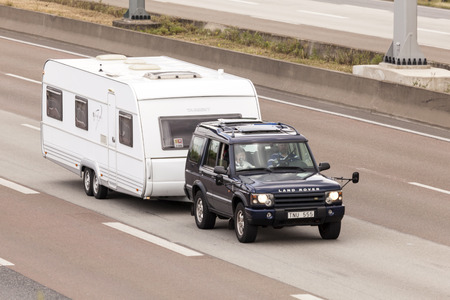Towing a Camper Trailer Poses Unique Risks
November 4, 2016 | Category: Automobile Accidents, Personal Injury | ShareThe beginning of fall marks the start of cold weather inching across our country. Many in the U.S. are putting away their campers for the season. However, here in Florida, our camping season never ends.
 With many national parks, forests, state parks, recreational areas, county and city parks along with private campgrounds, Florida is a Mecca for camping enthusiasts. On our roads and highways we often see pickup trucks, SUVs and cars towing camper trailers.
With many national parks, forests, state parks, recreational areas, county and city parks along with private campgrounds, Florida is a Mecca for camping enthusiasts. On our roads and highways we often see pickup trucks, SUVs and cars towing camper trailers.
There are specific requirements in Florida for vehicles when towing campers or any other vehicle. These requirements involve drawbars and other connections which need to be of sufficient strength to pull all the weight towed. The drawbar connection shall not exceed 15 feet from 1 vehicle to the other vehicle. When the connection consists of a chain, rope or cable, there shall be displayed upon such connection a white flag or cloth not less than twelve inches square.
“The risks of being in an accident when another vehicle tows a camper increase. There are many dangers which the operator towing the camper needs to consider before venturing out on Florida’s roads and highways. In an effort to help prevent these accidents, we are providing the following information from the Department of Motor Vehicles, CarTalk and Your RV Lifestyle on just some of the dangers these drivers need to avoid,” said Charlotte County Personal Injury Attorney, Randall Spivey of Spivey Law Firm, Personal Injury Attorneys, P.A.
Dangers to Avoid in Towing a Camper Trailer
- Overloading. There are serious consequences to overloading a towed vehicle. Exceeding the vehicle’s towing capacity will put unnecessary strain on the vehicle. More importantly, once the weight of a camper trailer exceeds the maximum capacity for the tow vehicle, the camping trailer will dominate the direction of tow, not the driver. In other words, you will be in a situation where ‘the tail is wagging the dog’ rather than the other way round, and this is obviously extremely dangerous.
- Find out exactly how much weight your vehicle can legally tow. The owner’s manual should tell you the exact capacity, or you could always search on the internet.
- Don’t forget that once you’ve stocked your camper trailer you will probably be adding around 200kg, per person, of weight to the rig.
- Acceleration. A camper trailer not only adds weight but also adds a lot of wind resistance. As such, a camper trailer has a slower acceleration ability. Allow for lower turning speeds and drive in the slower lane on the highway. Long uphill runs call for more caution. Because you must drive more slowly, expect that other vehicles behind you will frequently try to pass you.
- Tailgating. Leave plenty of room between you and the cars in front of you because the extra weight of the trailer affects your braking distances. Allow for longer stopping distances and turning speeds.
- Poorly calculated turns. When you are turning, you need to allow room for the vehicle and trailer to clear. Give adequate notice of your intentions with turn signals. Make slight steering wheel movements to make the turn. Slight steering wheel movements result in much greater movement in the rear of the trailer.
- Ensure the camper trailer is safely connected before driving. Before you hit the road with your trailer, make sure the trailer is safely connected to the hitch, and the brake lights and signals are working properly.
- Check brake lights and signals. Connect the electrical wires from the trailer to the vehicle. Paying particular attention to the risks of driving while towing a camper trailer, keeping your vehicle and trailer well maintained and ensure safe connections before you drive should result in an enjoyable camping experience.
Charlotte County Personal Injury Attorney,Randall L. Spivey is a Board Certified Trial Attorney – the highest recognition for competence bestowed by the Florida Bar and a distinction earned by just one (1%) percent of Florida attorneys. He has handled over 2,000 personal injury and wrongful death cases throughout Florida. For a free and confidential consultation to discuss your legal rights, contact the Spivey Law Firm, Personal Injury Attorneys, P.A., in Lee County at 239.337.7483 or toll free at 1.888.477.4839,or by email to Randall@SpiveyLaw.com. Visit SpiveyLaw.com for more information. You can contact Spivey Law Firm, Personal Injury Attorneys, P.A.in Charlotte County at 941.764.7748 and in Collier County 239.793.7748.

